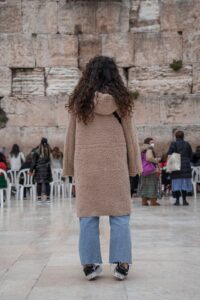A few weeks ago on, in the height of summer, the Jewish holiday cycle brought us to Tisha B’Av in which we commemorate the sudden, devastating destruction of the ancient temple in Jerusalem. As the temple was destroyed, fundamental assumptions, a way of being, and literally the ground on which the ancients stood were lost.
In our times, we have lost so much. And like our ancestors, we may feel like our foundations have crumbled and we are searching for solid ground on which to stand.
What can Jewish tradition offer us and we attempt to move forward into a “new normal” in the face of all that we have lost and all that is still unknown about how we will manage the health of our planet, our communities, our own minds and bodies, and those of our children?
Tisha B’Av reminds us to make space for our feelings of grief, anxiety, and fear, not just once but again and again. Like on Tisha B’Av, we may find comfort in the experience of communal mourning. We are not alone in our anxiety and devastation, and we are not even alone in our feeling of isolation.
Our tradition suggests that when we are lost and stuck, we may find a gateway through our tears. This has certainly been my experience.
Since the day the Temple was destroyed the gates of prayer were locked and prayer is not accepted as it once was, as it is said in lamentation of the Temple’s destruction…Yet, despite the fact that the gates of prayer were locked with the destruction of the Temple, the gates of tears were not locked.
Talmud, Berachot 32b
Or, as Aimee Ginsburg Bikel, an American-Israeli writer, journalist, and public speaker invites us:

Let your grief course through you
Like a great, grand river.
Its journey to the sea is long and winding
Sometimes, the rapids.
You are quite sure you will get lost. Drown.
Sometimes, the water flows so slowly,
you are sure you will be moored, forever.
Carving caverns and cracks in the sandstone
It will change youIt will shape you
Oh beautiful, brave soul
Do not build a dam,
Build a raft.
Hold on, allow.
For this is your sacred journey home
A holy gift for the patient, openhearted.
Last week I had the pleasure of kayaking on the Russian River. When we would come to a bend in the river, the current would become stronger and sweep me into the trees on the river bank. If I went with my instinct and resisted the current by paddling away, my kayak would spin and risk tipping. If I went with the current, I would bump into the trees and the be able to keep going. As Aimee Ginsburg Bikel writes, “Hold on, allow.” Off the river, I spend so much energy resisting the unpleasant realities of my internal and external circumstances. What would it be like to fully allow for, to take in, the truth of our lives and our hearts, if only for a few minutes? The lesson from the river is that it might actually be easier to move forward once we fully face that which we’ve been pushing away, and perhaps to even create the change that we’ve been trying to achieve.
The second invitation from the time of year is to turn love and compassion. Six days after Tisha B’Av, after remembering devastating loss, is the holiday of Tu B’Av.
Tu b’Av is the Jewish Valentine’s Day, the holiday of love. We are invited to explore the possibility of meeting our grief and fear with love and compassion. To hold our own heart, whatever state it is in, with tenderness. It is this stance of love and acceptance that makes way for the possibility of teshuva- of return to ourselves, of some change in the state of our hearts, of renewal no matter what is happening in our bodies. And this process of teshuva takes us all the way through the upcoming months of the High Holidays, during which we hold the hope for some internal shift independent of external circumstances.
The ground beneath us has shifted. Our children return to school and we return from our summer activities. Although we may not yet find solid ground beneath us, may we find a way to lean in to t- through tears, compassion, and teshuva.
